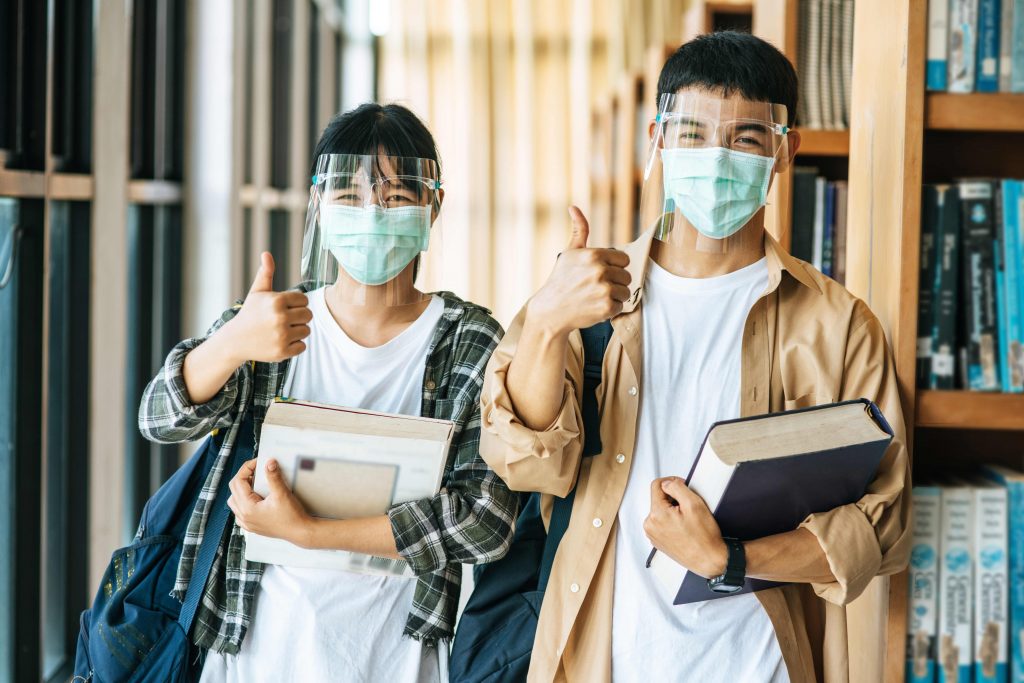Covid - 19 UpdateGuidelines for International Students traveling from India
Post the pandemic, there’s a drastic increase in the number of students fleeing abroad to pursue education. Also, with the new Covid Variants and restrictions, abroad education destinations have come up with their list of guidelines. Given below is a crux of them.

- Any student can travel only when vaccinated; also, note that Bharat Biotech’s Covaxin is not yet accepted worldwide.
- The USA has laid a travel ban for travelers from India. Nevertheless, students are allowed based on priority and best efforts. However, students who’ve contradicted the virus might have to wait for 3-4 months to travel.
- Students traveling to Canada have similar rules to the USA. Students, however, are allowed only on a case-to-case basis.
- Usually, there’s a gap between 1st and 2nd dose in India; international students are exempted from this, as stated by the Ministry of Health, India.
- France has its list of “Green Countries,” but India has not made it through the list. Students who are fully vaccinated, post two weeks of vaccination, can set to travel.
- Australia has slightly more stringent regulations compared to other countries. They’ve been closed since March 2020. They’re set to allow 800 International students per month from July 2021. However, India is on the “red list,” so it might take a while for Indian students to travel.
- China has banned Indians from traveling since Feb 2020. Despite the rollout of vaccines, strict regulations are laid on India. The Ministry of External Affairs is expected to intervene on the issue.
- On the flip side, the UK has fewer restrictions; if the student has a VISA, they can travel. Nevertheless, students have to self-quarantine for 10 days there.
Guidelines for International Students.
Guidelines for entry to Barbados:
- A valid Nasopharyngeal or Oropharyngeal COVID-PCR Test
- CPR tests on the day of arrival are expected.
- Students are expected to have a standard COVID-19 negative as a test result.
- A mandatory 7 days self-quarantine.
- Test on day 8 to release from quarantine
- Travellers from red list countries, whether vaccinated or unvaccinated will be treated the same.
Travellers from red list countries, whether vaccinated or unvaccinated will be treated the
Mandatory Requirements:
- The test sample is expected to be a nasopharyngeal or oropharyngeal swab (or both) taken by a certified medical professional.
- The sample must be taken within 3 days before arrival.
- The respective country’s medical authority should accredit the laboratory where the sample test was taken.
The following are not accepted:
- Nasal swab sample
- Saliva sample
- Self-administered tests (even if the sample was taken under the supervision of a medical practitioner)
- Home kits
- Rapid PCR tests
Guidelines for International Students.
Guidelines for entry to Barbados:
- A valid Nasopharyngeal or Oropharyngeal COVID-PCR Test
- CPR tests on the day of arrival are expected.
- Students are expected to have a standard COVID-19 negative as a test result.
- A mandatory 7 days self-quarantine.
- Test on day 8 to release from quarantine
- Travellers from red list countries, whether vaccinated or unvaccinated will be treated the same.
Travellers from red list countries, whether vaccinated or unvaccinated will be treated the
Mandatory Requirements:
- The test sample is expected to be a nasopharyngeal or oropharyngeal swab (or both) taken by a certified medical professional.
- The sample must be taken within 3 days before arrival.
- The respective country’s medical authority should accredit the laboratory where the sample test was taken.
The following are not accepted:
- Nasal swab sample
- Saliva sample
- Self-administered tests (even if the sample was taken under the supervision of a medical practitioner)
- Home kits
- Rapid PCR tests
Guidelines for entry to Kyrgyzstan:
- International travelers are to provide proof of COVID-19 vaccination or a negative PCR test from not older than 3 days before arrival.
- In case the arrival is delayed, the PCR test will not be accepted. A new test has to be taken on the day of arrival.
- Requirements are flexible, so have a check on them before planning for travel. Check with the airlines before travel.
- Vaccination from other countries is not entirely accepted. Also, the appointment card from vaccination centres is not designed to be used as proof of vaccination and should not be used to demonstrate vaccine status. Travelers are expected to take tests at their own risks.
- Travellers might get their temperatures tested at the time of arrival. Nevertheless, if any traveller shows symptoms, they are taken to medical facilities.
Guidelines for entry to Tajikistan and Kazakhstan
- It’s advised not to travel to Tajikistan and Kazakhstan currently pertaining to safety issues both due to Covid and terrorism.
- Unwanted travel to the areas around 30 km of the borders with Afghanistan, Kyrgyzstan, and Uzbekistan because of security concerns.
Guidelines for entry to Tajikistan and Kazakhstan
Wellbeing Guide for Students
Plan and verify your vaccine:
If you have vaccinated, check with the country you’re travelling to if they accept the respective vaccine you’ve injected. If not vaccinated, make sure you know which vaccines are accepted and vaccine accordingly.
Keep your physical and mental health in check:
Since you’ll be having too many things to be done, you might not prioritise your health. Have a frequent check on them so that the entire process goes at ease.
Keep a checklist of all the documents required to carry:
It’s pretty obvious that you’ll have to carry documents and get the paperwork done. Create a checklist and make sure you get them done.
Plan your travel well ahead:
Have frequent check-in with the airlines you’ll be travelling to be aware of the travel restrictions.
Be aware of the restrictions and precautionary measures to be taken:
The precautionary measures and restrictions are dynamic; before travelling, check with the regulations.













